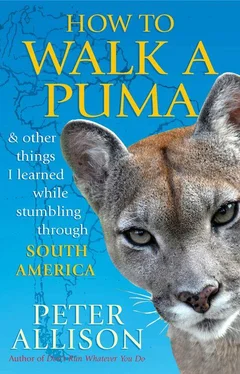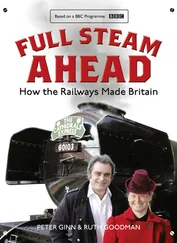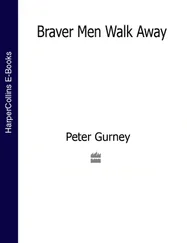‘Huge!’ Marcello said, echoing my thoughts.
We drove on from the swimming spot, and I noted with some regret just how many roads there were in the area. To build these roads, areas of wetland needed to be disturbed, which was in itself bad enough for the environment; but while the roads made travelling easy for tourists such as us, it also made access to the region easier for people with ill intent. This was brought starkly home when Marcello stopped the car and we walked towards some vultures we had seen circling, then dropping, at a point not far from the road. It turned out the target of the vultures’ interest was a caiman, this one no threat to us because of a bullet hole in its head and a hacked-off tail.
‘Poachers,’ Marcello said. ‘They will sell the meat to restaurants.’
We stood in respectful silence, like mourners at a funeral; there was no need to voice our disgust.
‘Shame,’ said Marcello, breaking the silence. ‘He was huge.’
We drove back to the camp where we were staying, showered, and prepared for an afternoon boat ride: the river was one of the finest vantage points for jaguar spotting since they often sun themselves on the banks. I felt a tingle of anticipation about our expedition.
As we set out the atmosphere was electric, and so were the eels. One briefly swam to the surface, and despite a lunatic compulsion to grab it to see just how strong the shock would be, I resisted. I had read that they could produce a high enough voltage to stop your heart. ‘People here fear these eels more than piranhas,’ Marcello explained. ‘It is only your movies that make people think piranhas are bad.’ No more swimming in this part of the river. Time to find a jaguar.
I tried to repress the enthusiasm I was feeling, something I do often. For years I’ve believed that pessimists are the happiest people on earth because they’re never disappointed, and frequently have more pleasant surprises than do starry-eyed optimists. Though I am occasionally accused of cynicism, none is needed to maintain low hopes. I also believe that the anticipation is often better than the reward (this works in reverse too—a needle hurts far less than the expectation of it).
That afternoon my bird-species count advanced at the pace of a child chasing an ice-cream truck—as we glimpsed Jabiru storks, scarlet ibis, wonderful Toco toucans with their absurd banana beaks, and Mardi Gras–coloured macaws. Unfortunately a jaguar failed to materialise.
That night we ate freshly caught fish from the river we’d just been on, and slurped thirstily at icy-cold beers before moving onto caipirinhas. This Brazilian specialty is delicious, sweet and sour: a cocktail so refreshing it’s impossible to stop at one. We didn’t, and were soon roaring with laughter at each other’s stories. Marcello had a bounty of jaguar tales, and I countered with stories of elephants and lions. With some guides the swapping of stories can become competitive, but this was just easy banter, and the Minke laughed at all of them, even though by now she’d already heard most of my stories as I tried to impress her with decade-old adventures, never mentioning the dull intervening years.
I lost track of the rounds of drinks we consumed, and while we needed to be up early (as is the case for almost any wildlife-spotting endeavour), the stories just kept coming. Rather than the animals we’d observed, many of our stories focused more on the tourists we’d led and their follies, and how hard it could be at times not to poke your own eyes out in frustration at their antics.
At one point I found myself asking Marcello what it was he loved about guiding.
‘I love the Pantanal,’ he said, with a resigned shrug. ‘I want others to love it too.’
I understood. I felt the same way about Africa’s wild places. But the next thing he described was something I had never experienced.
‘I was born here, a real Indian, in a tribe that lived in those hills that I showed you. I don’t even know how old I am, because we had no watches or calendars. We just hunted, fished, and lived with the animals, like animals.’
I was initially surprised to hear him say they lived like animals, but then I thought that maybe it was only in Western culture that the comparison would be considered derogatory. Such a strong link to a place as Marcello felt to the Pantanal was something that as a nomad I could not comprehend. For a moment I envied Marcello his deep roots, but that was only because I hadn’t yet heard the rest of his story.
‘Sometimes we would meet outsiders, but mostly we tried to avoid them. All they wanted was to take,’ he said, then hesitated. ‘Then some diamond miners came, and wanted what was under our land.’ He paused again, longer this time, and took a long draught from his drink. I signalled the barman, who began crushing limes for another round.
‘My people didn’t want the mine, so the miners attacked us,’ Marcello continued, and now the Minke and I realised this was a very different story from those we had heard so far. ‘They tied us up, and then attacked my mother. My father got free, and ran to help her, so they shot him. Then they shot my mother.’ Marcello’s face was red and crumpled with anguish, and a tear made its way along the creases.
‘I ran away, and kept running,’ he said. ‘I never went back. Some days later, I was found on a farm by some people who took me in. It was in the papers, that an Indian had been found on a farm, but I couldn’t tell anyone what had happened because nobody spoke my language.
‘I worked on the farm of the people who found me, and they adopted me, teaching me Portuguese. Then one day a neighbour had some tourists on his farm. He had heard that I was good at finding animals, so I helped with the tourists, and that is how I started guiding, learning English and some German too.’
‘You were very lucky that those people found you and took you in,’ the Minke said.
Marcello shrugged. ‘Yes … but they used to beat me. So much.’
The Minke and I both rocked back in our chairs, appalled.
Marcello’s broad shoulders shook with some suppressed memory. ‘I want a daughter,’ he said suddenly, changing the subject, ‘because they don’t get distracted like men do, chasing money and women, and she will learn languages so she can speak to everyone, and I will teach her to be the best guide in the Pantanal and show all these idiots guiding how to do it. They don’t love the Pantanal, they just want the tips. I want a daughter to do what I do. That would make a good future for this place.’
‘You’re an optimist,’ I said, leaving it at that, but wanting to commend him for his strength after all the hardships he had faced.
‘What else can you be?’ he asked simply.
Later that night the Minke and I wended our way along the path back to our rooms. ‘After that I really feel any complaints I have about my life are petty,’ the Minke said.
‘Me too,’ I agreed, and could add no more. I felt chastened when I remembered all the times I’d thought my life was hard, and flattered that Marcello shared such an insight. I was driven to protect animals because they mattered to me, but Marcello had a sense of ownership, kinship even, that I could only grasp at. Perhaps I needed to learn from Marcello. His life had dealt him more than I could probably have coped with, and he still held hope, and desire to do good. Borrowing some of his optimism, as the Minke and I reached the doors to our separate rooms I overcame my shyness, took her hand and pulled her close. She was a full head taller than me, but felt light, like bird wings. Then I reached up, and kissed her.
There’s a Jaguar!

Читать дальше













